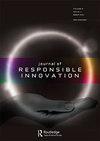Responsible innovation at work: gamification, public engagement, and privacy by design
IF 4.1
1区 哲学
Q1 ETHICS
引用次数: 0
Abstract
Public engagement is crucial to strengthen responsibility frameworks in highly innovative contexts, including as part of business organisations. One particular innovation that calls for public engagement is gami fi cation. Gami fi cation fosters changes in working practices to improve the organisation, e ffi ciency and productivity of a business by introducing grati fi cation and engagement mechanisms in non-gaming contexts. Gami fi cation modi fi es the workforce ’ s perception of constraints and stimulates the voluntary assumption of best practices to the bene fi t of employees and enterprises alike. Here, we broadly discuss the use of gami fi cation at work. Indeed, gami fi cation raises several concerns about privacy, due to the massive collection, storage and processing of data, and about the freedom of employees: as the level of data protection decreases, so too does workers ’ self-determination. We argue that the implementation of privacy by design can not only strengthen autonomy via data protection but also develop more viable instances of RRI in accordance with human rights.工作中的负责任创新:游戏化、公众参与和隐私设计
在高度创新的环境中,包括作为商业组织的一部分,公众参与对于加强责任框架至关重要。一个特别需要公众参与的创新是游戏。游戏奖励通过在非游戏环境中引入奖励和参与机制,促进工作实践的改变,从而提高组织、效率和业务生产力。Gami - fi改变了员工对约束的看法,并激发了对最佳实践的自愿假设,从而使员工和企业都受益。在这里,我们将广泛讨论游戏在工作中的使用。事实上,由于数据的大量收集、存储和处理,人工智能引发了人们对隐私和员工自由的担忧:随着数据保护水平的降低,员工的自主权也在下降。我们认为,通过设计实施隐私不仅可以通过数据保护加强自主权,还可以根据人权制定更可行的RRI实例。
本文章由计算机程序翻译,如有差异,请以英文原文为准。
求助全文
约1分钟内获得全文
求助全文
来源期刊

Journal of Responsible Innovation
Multiple-
CiteScore
8.60
自引率
20.50%
发文量
26
审稿时长
12 weeks
期刊介绍:
The Journal of Responsible Innovation (JRI) provides a forum for discussions of the normative assessment and governance of knowledge-based innovation. JRI offers humanists, social scientists, policy analysts and legal scholars, and natural scientists and engineers an opportunity to articulate, strengthen, and critique the relations among approaches to responsible innovation, thus giving further shape to a newly emerging community of research and practice. These approaches include ethics, technology assessment, governance, sustainability, socio-technical integration, and others. JRI intends responsible innovation to be inclusive of such terms as responsible development and sustainable development, and the journal invites comparisons and contrasts among such concepts. While issues of risk and environmental health and safety are relevant, JRI especially encourages attention to the assessment of the broader and more subtle human and social dimensions of innovation—including moral, cultural, political, and religious dimensions, social risk, and sustainability addressed in a systemic fashion.
 求助内容:
求助内容: 应助结果提醒方式:
应助结果提醒方式:


